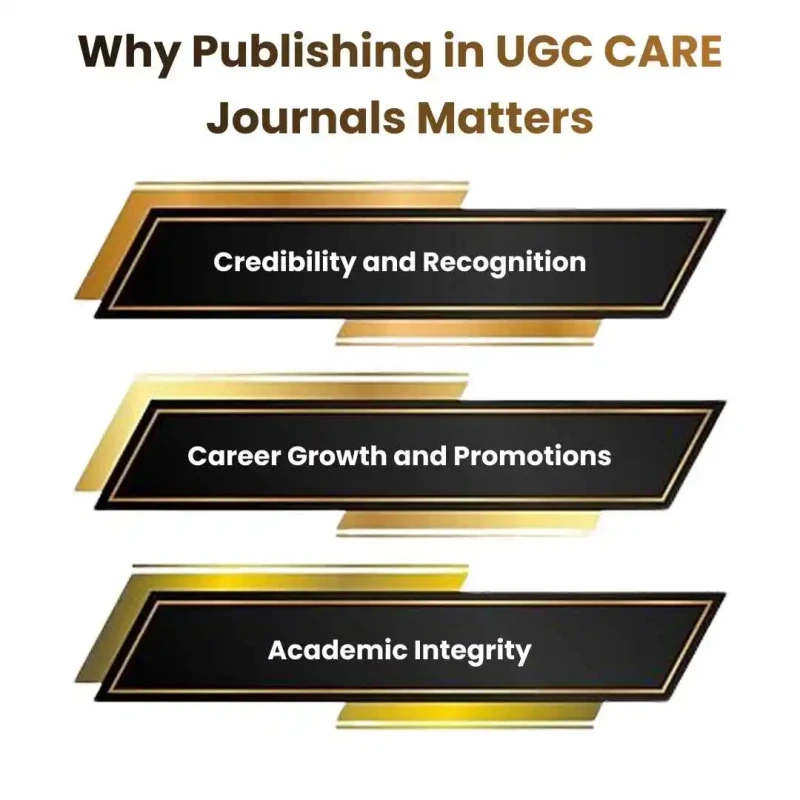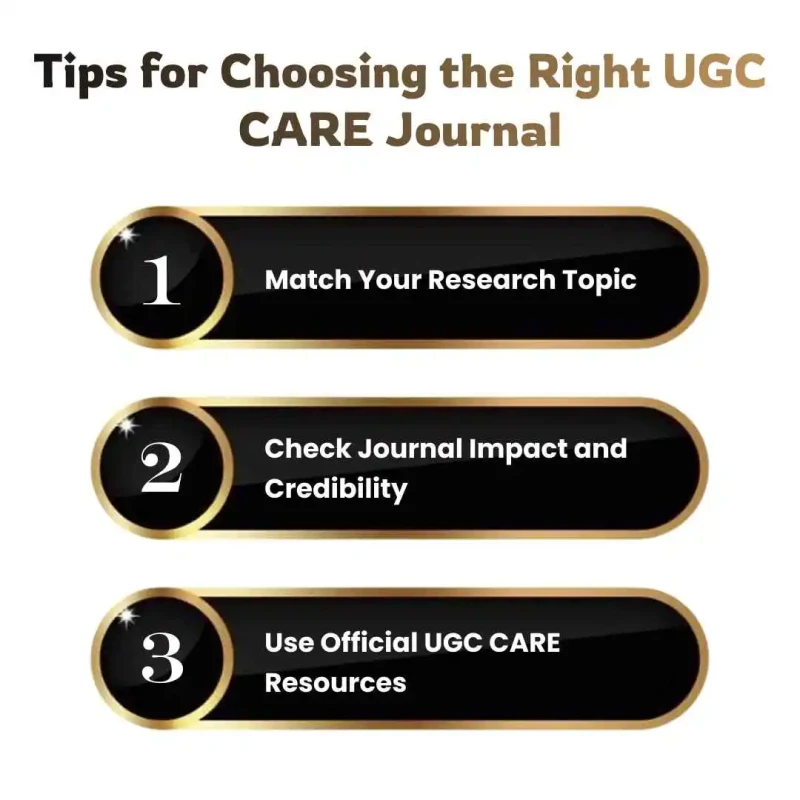Importance of Peer Review in Academic Publishing: Ensuring Research Quality and Credibility
Unlock the importance of peer review in academic publishing. Learn how to validate research, build credibility, and get your manuscript published faster

Jackson
The UGC CARE List is a lifeline for researchers navigating India’s crowded world of academic publishing. With countless journals claiming credibility, it’s easy to fall into predatory traps that can damage your academic record. The CARE List acts as a safeguard, a verified directory that separates authentic, peer-reviewed journals from the dubious ones.
This initiative by the UGC works to ensure that Indian research stands on par with global standards concerning quality and ethics.
For academics, getting published in a UGC-approved journal is more than a formality; it is proof of their credibility. It guarantees that their efforts pay off, your research is well-respected across the board, and your career path be it promotions, PhD submissions, or faculty appraisals stays on solid ground.
In this guide, we'll explain what the UGC CARE List is, why it matters, how to verify journals, and how to use it to strengthen your research impact.

Being published in a journal that is listed by UGC is a sign of credibility. If your research is published in a reputed journal, recognized by fellow researchers, institutes, and academic committees, it immediately adds credibility to your research portfolio. This can also generate more collaborations, conferences, and grant proposal.
Many universities and research institutions tie faculty promotions and appraisals to publications in UGC CARE journals. The logic is simple: Validated research equals validated career progress. For PhD holders, publishing in such journals often satisfies requirements for thesis submission and defense.
UGC Care List is not a list, but a filter of quality. It guides researchers towards authentic journals so that they maintain academic integrity, and your research doesn't go in vain in predatory or low-quality journals.
Knowing a journal’s status is crucial. Here’s a detailed step-by-step process:
Visit the official UGC CARE website to view the updated journal list. Avoid third-party sources—since they are typically outdated or unreliable.
Use the journal's ISSN (International Standard Serial Number) or title to check whether it is active or not.
Journals are grouped to represent their quality, indexing, and significance. Familiarize yourself with these categories to make the correct decision.
Although UGC Care Listing is essential, a cross-check with Scopus, Web of Science, or any other trustworthy database index gives an added layer of assurance.
Predatory journals have suspicion-raising editorial boards, extortionate publication fees, and promises of impossibly quick publishing. Look at the UGC CARE portal first always.
We know this process can feel a bit complicated, but don’t worry you’re not alone. Our guidance is here to make everything simple and manageable for you.
UGC CARE List contains journals from diverse fields, which are generally classified into STEM and AHSS categories:
They are experiment-based, research-oriented, scientific and technological advance-focused, and empirical research journals. They both consist of high-impact and routine journals, typically indexed in major scientific databases.
These are research journals for literature, sociology, psychology, economics, and other social science disciplines. They are just as crucial to making non-STEM field research have academic credibility.
The list has a tendency to classify journals by quality indicators and indexing. The more quality journals have stringent peer review, widespread readership, and a higher rate of citations. A table that is simple in form will allow researchers to compare:
|
Journal Type |
Examples |
Indexing |
Impact |
|
STEM |
XYZ Journal of Science |
Scopus, Web of Science |
High |
|
AHSS |
Indian Journal of Social Studies |
UGC Indexed |
Medium |
This is a little specific, but don't worry after you realize your field of study's scope, selecting the right category becomes really easy.
The UGC CARE List is reviewed and updated quarterly to ensure it maintains high academic standards. Journals are either added or removed based on their adherence to UGC’s quality benchmarks, ethical publishing practices, and indexing standards. This periodic revision helps keep the list credible and relevant for researchers.
The researchers have the option to either frequently visit the official UGC CARE website for updates or get notifications through their universities or academic bodies related to UGC. This will keep them informed about the journals that have been added to the list or removed from it.
Using an old version of the UGC CARE List may cause serious academic damages, like getting published in non-recognized journals, rejection during PhD submissions, or losing publication credit in faculty appraisals. Always check the journal's status before submission to save time and effort and to maintain academic integrity.
We know this can feel a bit tricky, but don't worry, with our PhD guidance, staying up to date with the UGC CARE List becomes easy and stress-free.
Here are five common mistakes researchers often make:
Publishing in Predatory Journals: Some journals might look official but are actually not. Always check on the authentic UGC CARE List prior to submission.
Ignoring Journal Scope: Your research should align with the journal's scope; incompatible topics tend to end up in rejection.
Using Outdated Lists: Make sure to refer to the recently updated UGC CARE List so as to avoid missteps and ensure that your concerns are duly taken care of
Overlooking Indexing: Failing to confirm whether the journal is indexed in Scopus, Web of Science, or other reputable databases can reduce the visibility and credibility of your research.
Skipping Submission Guidelines: Failing to follow the journal’s submission guidelines can lead to delays or even outright rejection.

Pick up a journal that evidently corresponds with your research area and approach. Usually, the mismatch of your topic with the journal’s scope results in rejection, irrespective of the quality of research. It is a good practice to constantly check the journal’s purposes, goals, and the latest articles before sending your work.
Examine the journal’s indexing status, citation count, peer-review procedure, and editorial board. The reputable journals are very open about their review periods, publication ethics, and author rules. Stay away from the journals that offer quick publication or charge hidden fees.
Journals should be verified exclusively through the official UGC CARE List portal. Frequently, third-party aggregators or unofficial websites provide outdated or incorrect information and, thus, mislead. Before proceeding with submission, always confirm the journal's details directly from UGC's platform.
The UGC CARE List is more than simply a list - it is a resource for researchers and scholars looking to find credible, trustworthy, and quality publications. Publishing in UGC approved journals will help your work be respected, protected from predatory traps, and help your academic profile.
If you would like support deciding on relevant journals or navigating the publishing process, feel free to connect with us. Our expert guidance helps you feel confident in decision-making that will enhance your career.
Unlock the importance of peer review in academic publishing. Learn how to validate research, build credibility, and get your manuscript published faster
Master the top methods of primary data collection in research methodology. Learn to use surveys, interviews, and experiments to gather original, high-quality data.
Don’t write your methodology without reading this. Learn why purposive sampling is essential for case studies and how to define your inclusion criteria. Url:purposive-sampling
Master the chapterization of thesis to ensure logical flow. Learn the standard academic framework for organizing research into a professional, approved document.
A practical guide to sentiment analysis research papers covering methodologies, datasets, evaluation metrics, research gaps, and publication strategies.
Master data analysis for research papers. Learn quantitative and qualitative methods, cleaning, and reporting standards to ensure your study meets journal rigour.